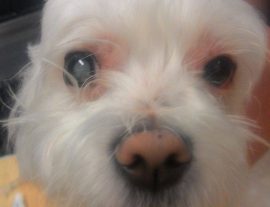Charli is a patient at Uni Vets Camden and has a classic case of cataracts.
Cataracts are a loss in transparency of the lens fibers or its capsule inside the eye that leads to blurred vision and eventually vision loss.
A common misconception is that cataracts in dogs is just a normal process of aging. Although aging can be a cause, it is more often a contributing factor to another medical condition. It is important to keep note of when you see changes in your dog’s eyes or you believe your dog’s vision is deteriorating or being compromised.
Cataracts can often be confused with nuclear sclerosis which presents in older dogs and is a normal change in the lens and appears as a slight greying inside the eye. As it is quite difficult to differentiate between cataracts and nuclear sclerosis, it is important to see your local vet so they can differentiate between the two. Cataracts have many causes and sometimes it may not be possible to identify the underlying factor.
Some of the common causes of cataracts include:

Charli's cataracts is clearly visible in the right eye
- Genetics - This tends to be the most common cause and can occur at any age, developing rapidly over a couple weeks or slowly over a couple years.
- Diabetes mellitus - This is the second most common cause for cataracts and forms shortly after developing diabetes.
- Immune-mediated reaction to the lens - This is the third most common type of cataract to form in dogs and is usually due to some other kind of eye disease or in response to a drug reaction.
It is important to understand that once a cataract has developed, there is no way to reverse the cloudiness of the lens without specialist surgery. It is important to rule out possible underlying causes of the cataract forming, as this may impact the management of the other eye and also establish whether surgery is recommended for the affected eye.
Remember to always take your pet to your local veterinarian for professional advice on these matters.
By Malcolm Geerling, 5th Year Veterinary Student, The University of Sydney


